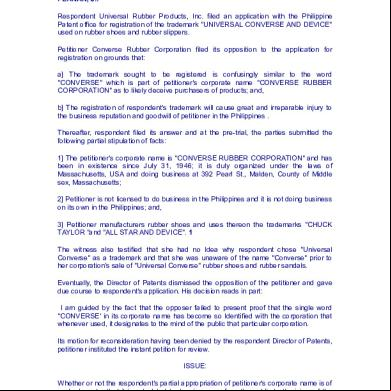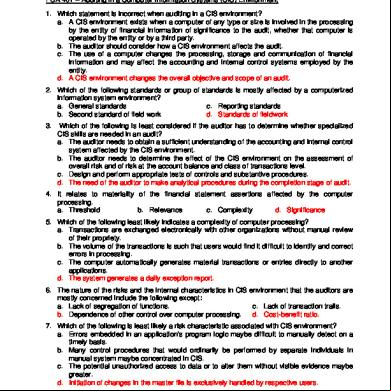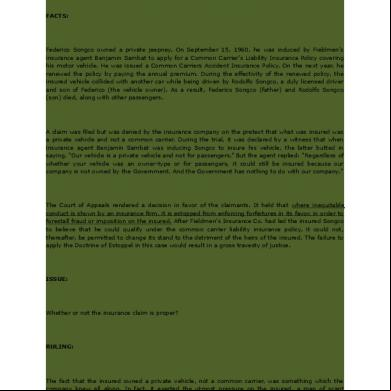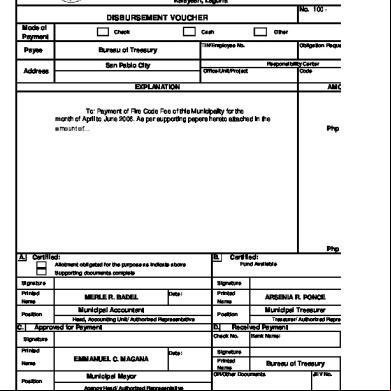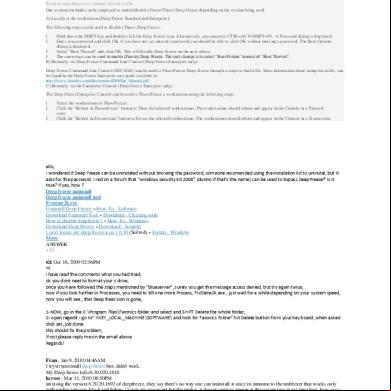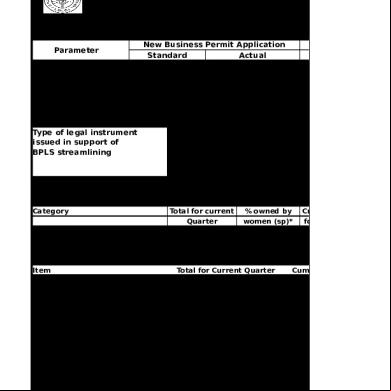Converse Rubber Corp. Vs. Universal Rubber Products , 1987 2p1s15
This document was ed by and they confirmed that they have the permission to share it. If you are author or own the copyright of this book, please report to us by using this report form. Report 3i3n4
Overview 26281t
& View Converse Rubber Corp. Vs. Universal Rubber Products , 1987 as PDF for free.
More details 6y5l6z
- Words: 1,797
- Pages: 3
SECOND DIVISION G.R. No. L-27906 January 8, 1987 CONVERSE RUBBER CORPORATION, petitioner, vs. UNIVERSAL RUBBER PRODUCTS, INC. and TIBURCIO S. EVALLE, DIRECTOR OF PATENTS, respondents. FERNAN, J.: Respondent Universal Rubber Products, Inc. filed an application with the Philippine Patent office for registration of the trademark "UNIVERSAL CONVERSE AND DEVICE" used on rubber shoes and rubber slippers. Petitioner Converse Rubber Corporation filed its opposition to the application for registration on grounds that: a] The trademark sought to be ed is confusingly similar to the word "CONVERSE" which is part of petitioner's corporate name "CONVERSE RUBBER CORPORATION" as to likely deceive purchasers of products; and, b] The registration of respondent's trademark will cause great and irreparable injury to the business reputation and goodwill of petitioner in the Philippines . Thereafter, respondent filed its answer and at the pre-trial, the parties submitted the following partial stipulation of facts: 1] The petitioner's corporate name is "CONVERSE RUBBER CORPORATION" and has been in existence since July 31, 1946; it is duly organized under the laws of Massachusetts, USA and doing business at 392 Pearl St., Malden, County of Middle sex, Massachusetts; 2] Petitioner is not licensed to do business in the Philippines and it is not doing business on its own in the Philippines; and, 3] Petitioner manufacturers rubber shoes and uses thereon the trademarks "CHUCK TAYLOR "and "ALL STAR AND DEVICE". 1 The witness also testified that she had no Idea why respondent chose "Universal Converse" as a trademark and that she was unaware of the name "Converse" prior to her corporation's sale of "Universal Converse" rubber shoes and rubber sandals. Eventually, the Director of Patents dismissed the opposition of the petitioner and gave due course to respondent's application. His decision reads in part: I am guided by the fact that the opposer failed to present proof that the single word "CONVERSE' in its corporate name has become so Identified with the corporation that whenever used, it designates to the mind of the public that particular corporation. Its motion for reconsideration having been denied by the respondent Director of Patents, petitioner instituted the instant petition for review. ISSUE: Whether or not the respondent's partial appropriation of petitioner's corporate name is of such character that it is calculated to deceive or confuse the public to the injury of the petitioner to which the name belongs. A trade name is any individual name or surname, firm name, device or word used by manufacturers, industrialists, merchants and others to Identify their businesses, vocations or occupations. 8 As the trade name refers to the business and its goodwill ... the trademark refers to the goods." 9 The ownership of a trademark or tradename is a property right which the owner is entitled to protect "since there is damage to him from confusion or reputation or goodwill in the mind of the public as well as from confusion of
goods. The modern trend is to give emphasis to the unfairness of the acts and to classify and treat the issue as fraud. 10 From a cursory appreciation of the petitioner's corporate name "CONVERSE RUBBER CORPORATION,' it is evident that the word "CONVERSE" is the dominant word which Identifies petitioner from other corporations engaged in similar business. Respondent, in the stipulation of facts, itted petitioner's existence since 1946 as a duly organized foreign corporation engaged in the manufacture of rubber shoes. This ission necessarily betrays its knowledge of the reputation and business of petitioner even before it applied for registration of the trademark in question. Knowing, therefore, that the word "CONVERSE" belongs to and is being used by petitioner, and is in fact the dominant word in petitioner's corporate name, respondent has no right to appropriate the same for use on its products which are similar to those being produced by petitioner. A corporation is entitled to the cancellation of a mark that is confusingly similar to its corporate name. Appropriation by another of the dominant part of a corporate name is an infringement." Respondent's witness had no Idea why respondent chose "UNIVERSAL CONVERSE" as trademark and the record discloses no reasonable explanation for respondent's use of the word "CONVERSE" in its trademark. Such unexplained use by respondent of the dominant word of petitioner's corporate name lends itself open to the suspicion of fraudulent motive to trade upon petitioner's reputation, thus: When, however, there is no reasonable explanation for the defendant's choice of such a mark though the field for his selection was so broad, the inference is inevitable that it was chosen deliberately to deceive. The testimony of petitioner's witness, who is a legitimate trader as well as the invoices evidencing sales of petitioner's products in the Philippines, give credence to petitioner's claim that it has earned a business reputation and goodwill in this country. Furthermore, said sales invoices provide the best proof that there were actual sales of petitioner's products in the country and that there was actual use for a protracted period of petitioner's trademark or part thereof through these sales. "The most convincing proof of use of a mark in commerce is testimony of such witnesses as customers, or the orders of buyers during a certain period. 18 Petitioner's witness, having affirmed her lack of business connections with petitioner, has testified as such customer, ing strongly petitioner's move for trademark pre-emption. Any sale made by a legitimate trader from his store is a commercial act establishing trademark rights since such sales are made in due course of business to the general public, not only to limited individuals. Such actual sale of goods in the local market establishes trademark use which serves as the basis for any action aimed at trademark pre- exemption. It is a corollary logical deduction that while Converse Rubber Corporation is not licensed to do business in the country and is not actually doing business here, it does not mean that its goods are not being sold here or that it has not earned a reputation or goodwill as regards its products. Another factor why respondent's applications should be denied is the confusing similarity between its trademark "UNIVERSAL CONVERSE AND DEVICE" and petitioner's corporate name and/or its trademarks "CHUCK TAYLOR" and "ALL STAR DEVICE" which could confuse the purchasing public to the prejudice of petitioner, The trademark of respondent "UNIVERSAL CONVERSE and DEVICE" is imprinted in a circular manner on the side of its rubber shoes. In the same manner, the trademark of petitioner which reads "CONVERSE CHUCK TAYLOR" is imprinted on a circular base attached to the side of its rubber shoes. The deteminative factor in ascertaining whether or not marks are confusingly similar to each other "is not whether the challenged mark would actually cause confusion or deception of the purchasers but whether the use of such mark would likely cause confusion or mistake on the part of the buying public. The similarity y in the general appearance of respondent's trademark and that of petitioner would evidently create a likelihood of confusion among the purchasing public. By appropriating the word "CONVERSE," respondent's products are likely to be mistaken as having been produced by petitioner. "The risk of damage is not limited to a
possible confusion of goods but also includes confusion of reputation if the public could reasonably assume that the goods of the parties originated from the same source. 23 Foreign corporation has a right to maintain an action in the forum even if it is not licensed to do business and is not actually doing business on its own therein has been enunciated many times by this Court. In La Chemise Lacoste, S.A. vs. Fernandez, 129 SCRA 373, this Court, reiterating Western Equipment and Supply Co. vs. Reyes, 51 Phil. 115, stated that: ... a foreign corporation which has never done any business in the Philippines and which is unlicensed and uned to do business here, but is widely and favorably known in the Philippines through the use therein of its products bearing its corporate and tradename, has a legal right to maintain an action in the Philippines to restrain the residents and inhabitants thereof from organizing a corporation therein bearing the same name as the foreign corporation, when it appears that they have personal knowledge of the existence of such a foreign corporation, and it is apparent that the purpose of the proposed domestic corporation is to deal and trade in the same goods as those of the foreign corporation. We further held:
xxx xxx xxx
That company is not here seeking to enforce any legal or control rights arising from or growing out of, any business which it has transacted in the Philippine Islands. The sole purpose of the action: Is to protect its reputation, its corporate name, its goodwill whenever that reputation, corporate name or goodwill have, through the natural development of its trade, established themselves.' And it contends that its rights to the use of its corporate and trade name: Is a property right, a right in recess which it may assert and protect against all the world, in any of the courts of the world even in jurisdictions where it does not transact business-just the same as it may protect its tangible property, real or personal against tres, or conversion. Since it is the trade and not the mark that is to be protected, a trademark acknowledges no territorial boundaries of municipalities or states or nations, but extends to every market where the trader's goods have become known and Identified by the use of the mark. The ruling in the aforecited case is in consonance with the Convention of the Union of Paris for the Protection of Industrial Property to which the Philippines became a party on September 27, 1965. Article 8 thereof provides that "a trade name [corporate name] shall be protected in all the countries of the Union without the obligation of filing or registration, whether or not it forms part of the trademark. " [emphasis supplied] The object of the Convention is to accord a national of a member nation extensive protection "against infringement and other types of unfair competition" [Vanitary Fair Mills, Inc. vs. T. Eaton Co., 234 F. 2d 6331. The mandate of the aforementioned Convention finds implementation in Sec. 37 of RA No. 166, otherwise known as the Trademark Law: Sec. 37. Rights of Foreign Registrants-Persons who are nationals of, domiciled or have a bona fide or effective business or commercial establishment in any foreign country, which is a party to an international convention or treaty relating to marks or tradenames on the repression of unfair competition to which the Philippines may be a party, shall be entitled to the benefits and subject to the provisions of this Act . . . ... WHEREFORE, the decision of the Director of Patents is hereby set aside.
goods. The modern trend is to give emphasis to the unfairness of the acts and to classify and treat the issue as fraud. 10 From a cursory appreciation of the petitioner's corporate name "CONVERSE RUBBER CORPORATION,' it is evident that the word "CONVERSE" is the dominant word which Identifies petitioner from other corporations engaged in similar business. Respondent, in the stipulation of facts, itted petitioner's existence since 1946 as a duly organized foreign corporation engaged in the manufacture of rubber shoes. This ission necessarily betrays its knowledge of the reputation and business of petitioner even before it applied for registration of the trademark in question. Knowing, therefore, that the word "CONVERSE" belongs to and is being used by petitioner, and is in fact the dominant word in petitioner's corporate name, respondent has no right to appropriate the same for use on its products which are similar to those being produced by petitioner. A corporation is entitled to the cancellation of a mark that is confusingly similar to its corporate name. Appropriation by another of the dominant part of a corporate name is an infringement." Respondent's witness had no Idea why respondent chose "UNIVERSAL CONVERSE" as trademark and the record discloses no reasonable explanation for respondent's use of the word "CONVERSE" in its trademark. Such unexplained use by respondent of the dominant word of petitioner's corporate name lends itself open to the suspicion of fraudulent motive to trade upon petitioner's reputation, thus: When, however, there is no reasonable explanation for the defendant's choice of such a mark though the field for his selection was so broad, the inference is inevitable that it was chosen deliberately to deceive. The testimony of petitioner's witness, who is a legitimate trader as well as the invoices evidencing sales of petitioner's products in the Philippines, give credence to petitioner's claim that it has earned a business reputation and goodwill in this country. Furthermore, said sales invoices provide the best proof that there were actual sales of petitioner's products in the country and that there was actual use for a protracted period of petitioner's trademark or part thereof through these sales. "The most convincing proof of use of a mark in commerce is testimony of such witnesses as customers, or the orders of buyers during a certain period. 18 Petitioner's witness, having affirmed her lack of business connections with petitioner, has testified as such customer, ing strongly petitioner's move for trademark pre-emption. Any sale made by a legitimate trader from his store is a commercial act establishing trademark rights since such sales are made in due course of business to the general public, not only to limited individuals. Such actual sale of goods in the local market establishes trademark use which serves as the basis for any action aimed at trademark pre- exemption. It is a corollary logical deduction that while Converse Rubber Corporation is not licensed to do business in the country and is not actually doing business here, it does not mean that its goods are not being sold here or that it has not earned a reputation or goodwill as regards its products. Another factor why respondent's applications should be denied is the confusing similarity between its trademark "UNIVERSAL CONVERSE AND DEVICE" and petitioner's corporate name and/or its trademarks "CHUCK TAYLOR" and "ALL STAR DEVICE" which could confuse the purchasing public to the prejudice of petitioner, The trademark of respondent "UNIVERSAL CONVERSE and DEVICE" is imprinted in a circular manner on the side of its rubber shoes. In the same manner, the trademark of petitioner which reads "CONVERSE CHUCK TAYLOR" is imprinted on a circular base attached to the side of its rubber shoes. The deteminative factor in ascertaining whether or not marks are confusingly similar to each other "is not whether the challenged mark would actually cause confusion or deception of the purchasers but whether the use of such mark would likely cause confusion or mistake on the part of the buying public. The similarity y in the general appearance of respondent's trademark and that of petitioner would evidently create a likelihood of confusion among the purchasing public. By appropriating the word "CONVERSE," respondent's products are likely to be mistaken as having been produced by petitioner. "The risk of damage is not limited to a
possible confusion of goods but also includes confusion of reputation if the public could reasonably assume that the goods of the parties originated from the same source. 23 Foreign corporation has a right to maintain an action in the forum even if it is not licensed to do business and is not actually doing business on its own therein has been enunciated many times by this Court. In La Chemise Lacoste, S.A. vs. Fernandez, 129 SCRA 373, this Court, reiterating Western Equipment and Supply Co. vs. Reyes, 51 Phil. 115, stated that: ... a foreign corporation which has never done any business in the Philippines and which is unlicensed and uned to do business here, but is widely and favorably known in the Philippines through the use therein of its products bearing its corporate and tradename, has a legal right to maintain an action in the Philippines to restrain the residents and inhabitants thereof from organizing a corporation therein bearing the same name as the foreign corporation, when it appears that they have personal knowledge of the existence of such a foreign corporation, and it is apparent that the purpose of the proposed domestic corporation is to deal and trade in the same goods as those of the foreign corporation. We further held:
xxx xxx xxx
That company is not here seeking to enforce any legal or control rights arising from or growing out of, any business which it has transacted in the Philippine Islands. The sole purpose of the action: Is to protect its reputation, its corporate name, its goodwill whenever that reputation, corporate name or goodwill have, through the natural development of its trade, established themselves.' And it contends that its rights to the use of its corporate and trade name: Is a property right, a right in recess which it may assert and protect against all the world, in any of the courts of the world even in jurisdictions where it does not transact business-just the same as it may protect its tangible property, real or personal against tres, or conversion. Since it is the trade and not the mark that is to be protected, a trademark acknowledges no territorial boundaries of municipalities or states or nations, but extends to every market where the trader's goods have become known and Identified by the use of the mark. The ruling in the aforecited case is in consonance with the Convention of the Union of Paris for the Protection of Industrial Property to which the Philippines became a party on September 27, 1965. Article 8 thereof provides that "a trade name [corporate name] shall be protected in all the countries of the Union without the obligation of filing or registration, whether or not it forms part of the trademark. " [emphasis supplied] The object of the Convention is to accord a national of a member nation extensive protection "against infringement and other types of unfair competition" [Vanitary Fair Mills, Inc. vs. T. Eaton Co., 234 F. 2d 6331. The mandate of the aforementioned Convention finds implementation in Sec. 37 of RA No. 166, otherwise known as the Trademark Law: Sec. 37. Rights of Foreign Registrants-Persons who are nationals of, domiciled or have a bona fide or effective business or commercial establishment in any foreign country, which is a party to an international convention or treaty relating to marks or tradenames on the repression of unfair competition to which the Philippines may be a party, shall be entitled to the benefits and subject to the provisions of this Act . . . ... WHEREFORE, the decision of the Director of Patents is hereby set aside.
